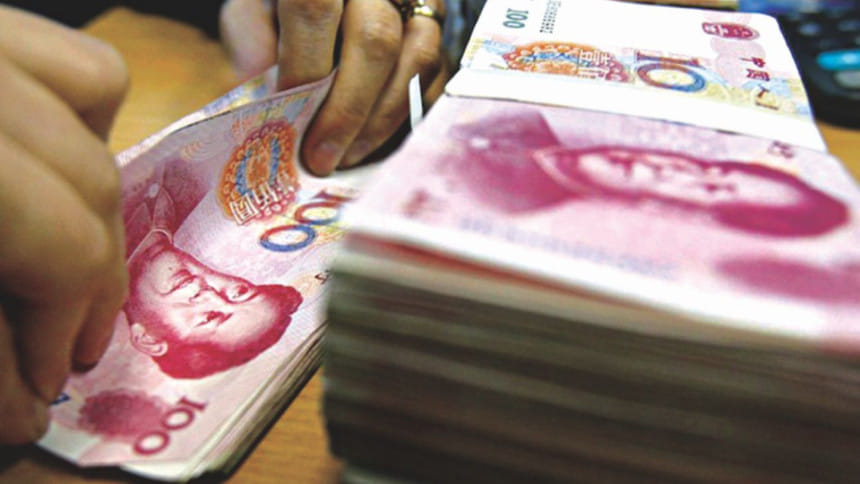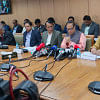Three's a crowd: What can China do?

Policymakers in Beijing are backed into a corner with only tough choices left to make. They need to push through with reforms to fully liberalise exchange rate and capital account, or lose credibility as a newly established reserve currency holder. But letting markets decide exchange rate and capital flows (which include portfolio investment, purchases of overseas financial instruments, foreign bank loans, derivatives etc.) can seriously exacerbate challenges facing the world's second-largest economy.
For the purposes of this write-up, it is important to recognise that Beijing is increasingly facing the confinements of the "Impossible Trinity", also known as the "Trilemma". This age-old concept, introduced by economists Robert Mundell and Marcus Fleming, shows that no government can control both exchange rate and interest rates while allowing free capital flows. They can at best target two of these variables, with the third left to market forces. Essentially, governments have the following options:
(i) If capital flows are liberalised, the government can pursue a stable or pegged exchange rate policy and forgo an autonomous monetary policy as domestic interest rates will have to move in accordance with world interest rates.
(ii) The government can sacrifice exchange rate stability if it wants monetary policy autonomy and free capital flows. The interest rate differential between domestic and world market will then drive capital flows and determine equilibrium exchange rate.
(iii) Finally, the government can control both interest rate and exchange rates but forgo free capital flows, by imposing capital controls.
Historically, Beijing has followed the third option outlined above. Now the onus is on policymakers to shift towards the second option, but can they actually make the transition amid present domestic and international macroeconomic conditions? Given subdued growth prospects, dented confidence in China's policy credibility, large stock market sell-offs and US interest rate hike, a disorderly and sharp depreciation of the Renminbi is quite likely if only markets decided its fate.
Now the question arises how further depreciation (associated with a more flexible Renminbi) will affect China. Improvement in trade performance is doubtful, given persistently weak global demand. More importantly China's massive pile of foreign currency denominated corporate debt is at risk. Depreciating exchange rates will raise the cost of servicing unhedged debts, reducing profits or depleting capital buffers. This is likely to impede future growth, business expansion plans and ultimately China's transition to a more consumption-driven economy. Additionally, episodes of sharp depreciations will no doubt create panic in global markets and raise possibilities of 'competitive devaluation' by neighbouring economies. In all likelihood, China would want to avoid such geopolitically-sensitive scenarios if it wants to maintain goodwill, protect its growing strategic role in the international financial system and promote the Renminbi's reserve currency status. These underlying exchange rate risks imply that Beijing will retain significant control over the Renminbi in the short-term and utilise its foreign reserves to prevent sharp depreciation.
Given an objective of exchange rate stability, how is monetary policy affected? Latest developments provide a clear picture. The People's Bank of China has been aggressively pumping money into the economy in recent months to boost demand and offset monetary contraction caused by capital outflows. But its ongoing foreign exchange intervention (to prevent sharp exchange rate depreciation) is directly undermining liquidity-injection policy (when the central bank sells foreign currency, the local currency it receives in exchange is drained from domestic money supply). Here lies China's "Impossible Trinity" - as long it maintains existing level of capital account openness, it cannot hope to control both monetary and exchange rate policy.
It is unlikely that policymakers will allow further loss of monetary policy autonomy at a time when the domestic economy is attempting to transition towards a consumption-driven growth model. The central bank recently shifted towards benchmark interest-rate targeting (through open market operations) away from administrative control of interest rates and quantitative targets of bank lending and monetary aggregates. The motivation behind this is simple – targeting interest rates strengthens monetary policy transmission. Authorities certainly would not have undertaken this step if they planned on relinquishing control over monetary policy. So if it wants to control both interest rates and exchange rate, authorities need to temporarily dial back its existing level of financial openness and resume liberalisation initiatives once global markets settle down and capital outflows decrease. There is evidence that some capital account 'de-liberalisation' is already happening in China. Tightening purchases of overseas insurance products, restricting companies' foreign exchange purchases and suspending selected international banks' foreign exchange business are notable examples.
China's predicament offers a valuable lesson in macroeconomic policy for developing countries, considering greater integration with international financial markets. If monetary policy autonomy is a priority, capital account liberalisation should come after a country's transition to a flexible exchange rate – not before it. Otherwise, restrictions of the "Impossible Trinity" will come knocking on the government's doors.
The writer currently works as a Macroeconomic Analyst for an organization in Washington D.C. He is a Fellow for the Asian Center for Development in Dhaka.
Email: [email protected]

 For all latest news, follow The Daily Star's Google News channel.
For all latest news, follow The Daily Star's Google News channel. 








Comments